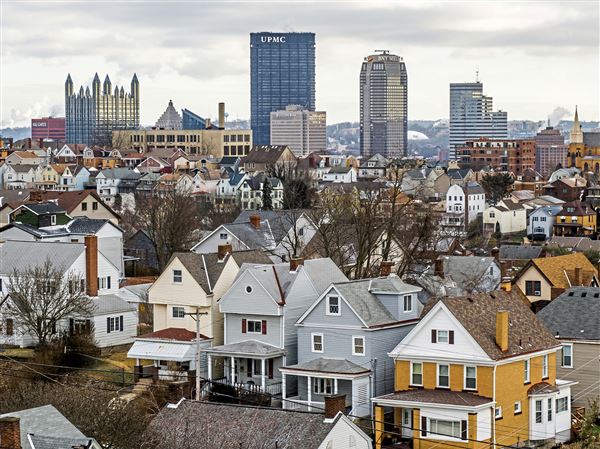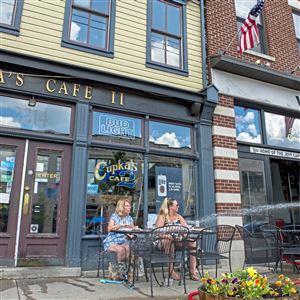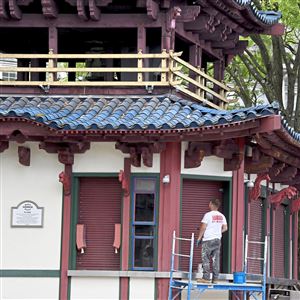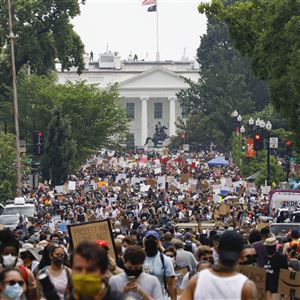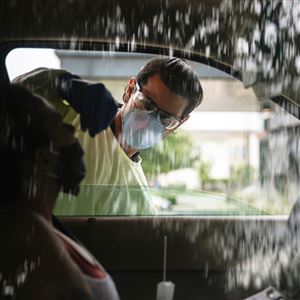HARRISBURG — Face masks are now mandatory in all public spaces, according to an order signed Wednesday by Gov. Tom Wolf and state Health Secretary Dr. Rachel Levine.
The order requires masks to be worn inside where the general public is admitted and outdoors when a distance of 6 feet cannot be consistently maintained.
Also on Wednesday, a divided state Supreme Court ruled the GOP-controlled Legislature cannot force Mr. Wolf to end his coronavirus disaster declaration, handing the Democratic governor a victory that could be vital should cases surge again.
The mask order was made amid an uptick of new positive cases of COVID-19. The state health department on Wednesday reported over 600 new cases of the virus, including 194 in Western Pennsylvania. In Allegheny County, 110 were reported, the second straight day the county reported more than 100 cases.
With Allegheny County under a self-imposed order to ban alcohol sales for on-site consumption at bars and restaurants, the move to mandate masks at the state level was applauded by Dr. Debra Bogen, the director of the Allegheny County Health Department.
“I think it’s a great order,” she said. “The order was in effect all along, but it’s much more specific and clear. It gives more specific guidance on being outdoors and being safe even outdoors. I like to run, and I don’t like to run with a mask, but one of the things the order says is that if you’re outside, you need to stay 6 feet away or keep a mask on. So keeping your distance, I try to like veer away from people, but again, I will never leave my house without a mask, even when I’m running now. I think other people should follow that guidance.”
Prior to the governor’s order, masks were only required when entering businesses. In a tweet, the governor said they must now be worn “whenever anyone leaves home.”
There are a few exceptions to the order, including for individuals with medical or mental health conditions or those with disabilities. Exceptions also will be allowed for workers where a mask would be deemed unsafe, such as when operating equipment. Children under the age of 2 also will not be required to wear a mask.
The order reiterates that workers must wear masks when preparing food or interacting with members of the public.
“This mask-wearing order is essential to stopping the recent increase in COVID-19 cases we have seen in Pennsylvania,” Mr. Wolf said. “Those hot spots can be traced to situations where Pennsylvanians were not wearing masks or practicing social distancing — two practices that must be adhered to if we want to maintain the freedoms we have in place under our reopening.”
At the Supreme Court, it rejected the argument that the Legislature can unilaterally terminate the governor’s emergency powers by resolution.
Writing for the majority, Justice David Wecht emphasized that the court was not offering an opinion on Mr. Wolf’s response to the pandemic, but rather whether lawmakers could act without facing the governor’s veto.
The resolution “required presentment,” Justice Wecht wrote, “a key component of our Constitution’s balance of powers among the several branches of government, a balance that prevents one branch from dominating the others.”
The justices also ruled the governor’s actions to suspend laws are consistent with the powers the Legislature granted him.
“Current members of the General Assembly may regret that decision, but they cannot use an unconstitutional means to give that regret legal effect,” Justice Wecht wrote, adding, “the powers delegated to the Governor are admittedly far-reaching, but nonetheless are specific.”
In March, Mr. Wolf issued the emergency order as Pennsylvania began reporting its first COVID-19 infections. The declaration greatly expanded Mr. Wolf’s powers, allowing him to suspend regulations and control travel to and from certain areas. At the same time, Mr. Wolf and Dr. Levine ordered the closure of all businesses except those deemed “life-sustaining” to slow the spread of the virus and keep hospitals from becoming overwhelmed.
Republican leaders in the Legislature decried the closures as unfair to small businesses, and pushed to reopen sectors of the economy through legislation, which Mr. Wolf vetoed.
In early June, Republicans and a handful of Democrats gave final approval to a resolution leadership said would compel Mr. Wolf to terminate the disaster declaration. GOP lawmakers argued state law provides the option as a check on the executive branch, while Mr. Wolf said he’s empowered by the Constitution to approve or reject the resolution, as he can with legislation.
The high court sided with Mr. Wolf and nullified the Legislature’s resolution.
“The administration is pleased with the Supreme Court’s decision keeping in place the disaster proclamation to assist in the state’s response to the pandemic and to provide protections for businesses, workers, and residents,” said Lyndsay Kensinger, a spokesperson for Mr. Wolf.
Top Senate Republican Joe Scarnati, of Jefferson County, said in a statement the ruling “fails to uphold the constitutional balance of power between the three, co-equal branches of government.”
“The court has essentially granted the governor king status,” said Senate Majority Leader Jake Corman, R-Centre.
The case largely centered around a portion of the state’s emergency code, which says, in part, “The General Assembly by concurrent resolution may terminate a state of disaster emergency at any time. Thereupon, the governor shall issue an executive order or proclamation ending the state of disaster emergency.”
The Legislature argued that “shall issue” meant the governor had to comply should the resolution be passed. But Mr. Wolf argued he still had the power to accept or reject the resolution, a necessary check and balance to prevent the Legislature from interfering during an emergency.
Republicans, however, decried that position, claiming it allowed Mr. Wolf to indefinitely declare an emergency and assume far greater power unless and until two-thirds of the House and Senate voted to override his veto of the resolution — a tough bar to meet in Pennsylvania.
In his defense, Mr. Wolf contended ending the disaster declaration would not allow businesses to fully reopen — which was the impetus for the GOP’s action — because much of his administration’s power to impose restrictions stems from a law governing disease prevention.
Instead, Mr. Wolf argued, ending the declaration would rescind protections enacted in response to the pandemic and the subsequent economic downturn, such as the suspension of licensing requirements for health care workers or a temporary moratorium on evictions and foreclosures.
“Ending the disaster declaration would not reopen anything. It just wouldn’t,” Mr. Wolf said in June. “And anybody who says differently is wrong.”
The ruling was the first of two constitutional showdowns between Mr. Wolf and the Legislature. Still pending is a Republican suit to force the Wolf administration to comply with a subpoena for documents related to the state’s coronavirus business waiver program that allowed some nonessential businesses to reopen, while others had to remain shuttered.
Hallie Lauer: hlauer@post-gazette.com. Spotlight PA is an independent, nonpartisan newsroom powered by The Philadelphia Inquirer in partnership with the Pittsburgh Post-Gazette and PennLive/Patriot-News. Sign up for our free weekly newsletter.
First Published: July 1, 2020, 8:34 p.m.
